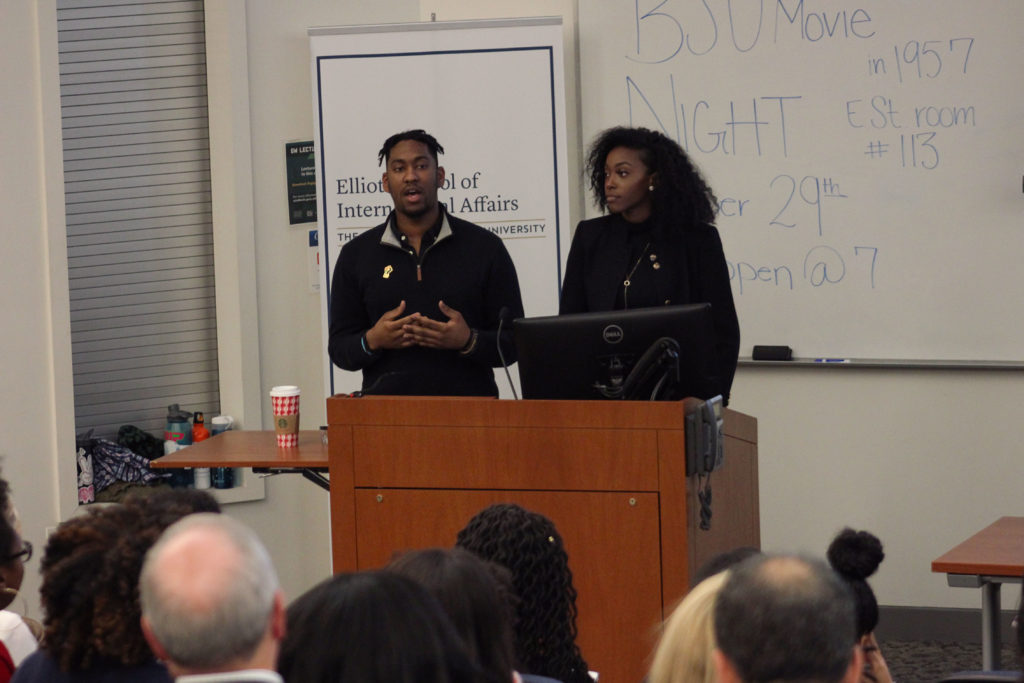The Black Student Union hosted a town hall at the Elliott School of International Affairs Thursday to discuss changing the University’s culture.
The town hall was attended by about 150 students, administrators and student organization leaders, including University President Thomas LeBlanc; Caroline Laguerre-Brown, the vice provost for diversity, equity and community engagement; and Cissy Petty, the dean of the student experience. The discussion gave students the opportunity to voice their concerns about issues – like a lack of diversity among faculty and how the University handled a racist Snapchat incident in February – that affect the black student community.
Throughout the two-and-a-half-hour town hall, Michael Ferrier, the president of BSU, placed an emphasis on keeping discourse constructive. He called for students to present tangible solutions to solve the problems facing them.
‘Moving on from Alpha Phi’
Students at the town hall expressed their frustration about the way the University handled a racist Snapchat incident last spring.
One student said a major issue in how the University dealt with the incident was the lack of communication with the student body about the investigation, which one student said was an important aspect of moving forward from the incident.
“I feel like the University has a lack of transparency when it comes to these issues,” she said. “When we’re talking about moving forward, there has to be a lot of transparency, integrity, honesty and respect.”
Laguerre-Brown, the vice provost for diversity, equity and community engagement, said that although the University would have ideally been more transparent, federal laws prevented them from “talking about the details surrounding the investigations.”
“What I think that we tried to do, and I think that it’s clear that did not resonate with you the way that we wanted it to, is say that this particular situation is much more complicated than that photograph makes it appear,” Laguerre-Brown said. “But we recognize that black students were having a hard time on this campus, and that’s an understatement.”
Criticisms of The Hatchet
Multiple students at the town hall said they were angry and disappointed with The Hatchet’s Nov. 1 story detailing 31 students’ concerns about 4-RIDE, a “student safe ride service.” Students at the town hall said the article did not fairly portray 4-RIDE drivers, most of whom are black.
A freshman majoring in criminal justice said at the town hall that the article was a “microinvalidation” against the black community. She said the article indirectly labeled black drivers as “being scary,” which she said is “very far from the truth.”
“I just feel like when I read that article — not going to lie — I felt offended,” she said. “You’re invalidating those drivers, you’re invalidating their work.”
The article quoted a freshman who said she took a 4-RIDE from CVS late one night after recalling that a robbery had recently taken place there and she said she felt afraid after the driver allegedly made a sarcastic comment to her.
“It was helpful, but the driver should be a little bit nicer and more welcoming because people use it when they are scared,” the student told The Hatchet. “When the drivers are just as mean and scary as the people you are scared of, it’s scary.”
Another student said the quote may reflect a lack of care in word choice, but it still caused real harm.
“When we have people speaking on behalf of the campus and they don’t speak carefully, they don’t tread lightly, that’s when we deal with impact over intent,” she said. “She might not have intended to say something racist, but that’s what we felt, that’s what the population in this room felt, and we were offended and that’s what matters.”
Diversity and inclusion on campus
Multiple students also raised concerns about the diversity of the faculty teaching their courses. Provost Forrest Maltzman responded to some concerns, saying that officials “haven’t made enough progress” but he highlighted the University’s “very intensive unconscious bias training” in the search committees that hire new faculty.
“There are endless studies about the number of grants teams get, the productivity and research, and all of these things are suggesting – by every method that we use – that a diverse group is more successful there,” Maltzman said.
Bishop Walton, a freshman majoring in political science, raised the issue of inclusion within the Student Association. He said when he was interviewing for a freshman senator position earlier this semester, he was greeted by three white people — for which SA President Ashley Le apologized.
Ojani Walthrust, the SA’s executive vice president, said the SA Senate has students of color, but diversity remains a problem for the SA. Walthrust ran on a platform highlighting diversity and inclusion efforts in the spring, and the SA launched a diversity and inclusion assembly earlier this semester.
“I’ve been working day and night to ensure that there is an increase in the number of students of color in the Student Association,” he said. “It’s important to have all different ideas and all different perspectives on the table.”





